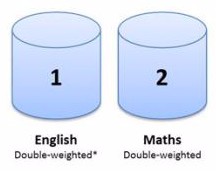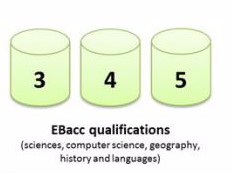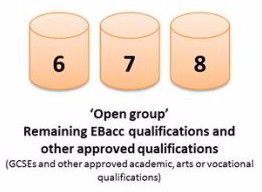Since its announcement, the new Progress 8 measures have caused debate, disgruntlement and disagreement. Certain qualifications are being actively marginalised while certain subjects are being elevated. But there is a hidden implication that hasn’t reared it’s ugly head yet. It has been brewing for some time but bubbling under the surface (how close to the surface depends on your perspective). The implied value attached to subjects in the new Progress 8 measures has massive implications for the future. But it isn’t just your students that are affected.
Double Weighted
If you teach a Double-Weighted subject you will be well used to being in the spotlight of scrutiny and accountability. You will have endured years of ever increasing pressure and workload as schools clamber for improvements in the headline measure of 5 A* to C Including English and Maths. There’s nothing new in these new measures for you… or is there?
If you are an English Teacher you will be accountable for the weight of three subjects in the same timetable allocation as a single weighted subject. The best of either English Language OR Literature will be double weighted and the other will count in the Open Group. Neither qualification will escape the intense scrutiny associated with being a Core subject as EITHER could be double weighted. Which one finally is will not be known until results day. Therefore English Language and English Literature will BOTH be scrutinised as though they were double weighted. In effect there is an implied quadruple weighting to the outcomes of English lessons. Two subjects being delivered in one timetable allocation and either one could become double weighted. You think it’s tough now? Buckle up. It’s about to get a whole lot rougher.
EBacc Group
The “cohort game” is over… to a certain extent. If you have ever had the conversation “Should we enter student X?” you know the game I refer to. EBacc Group teachers may find themselves with a double edged sword in terms of take up at KS4. Where previously a subject enjoyed success with the 28 students that chose to pursue it, it may find itself in a situation where double those numbers are taking it. “Great!” they might think, until the realisation dawns that students who haven’t “chosen” the subject, have no natural ability and do not “value” the subject are now accountable for. The level of accountability and therefore pressure will increase accordingly albeit to a lesser extent than in English and Maths unless the entire cohort has to take the subject. The “Options Evening Game” begins. You may well steer students, less likely to achieve, away from your subject. You may well lay early bait for those with natural aptitude and will focus on them for early intervention in KS3.
However you will also have your intake dictated from above. Those students capable of achieving better in your subject as opposed to the others in the EBacc basket will be placed in your groups. Previously they were enticed away by Open Group subjects and other qualifications and you were left with the 28 that like either the subject, you or both. Your cohort dynamic just changed significantly and with the increase in accountability you better buckle your seatbelt for the ride ahead.
Other Group
If you teach one of these subjects, clap your hands, dance a jig and rejoice. Your best case scenario is that nobody chooses your subject at KS4. If this happens, the only accountability headed your way is in the form of KS3 progress. Let’s say you teach “Gardening” and base your KS3 assessments entirely on practicals. All of your Christmases just arrived at once. No marking. No book scrutinies. No triple marking feedback stickers with 4 different coloured highlighters and 3 different coloured pens No KS4 students that didn’t choose your subject. No intervention strategies to coordinate. No after school or lunchtime catch up sessions to plan and run. No meetings with Heads of Faculty to explain underachievement or reports to write for SLT. No progress meetings or feedback sessions. Just you, your groups and the world of flora and fauna to explore and discover together.
So, instead you might “give your time” to organise the flower show and bask in the public glow of its success. You enter students for local or even National vegetable competitions and celebrate the successes widely. You may even divert your extra free time towards research and contribute to the National College of Teaching; gain a masters in your chosen field; volunteer to shadow an experienced member of SLT for “CPD experience”. You might experiment with riskier teaching and learning strategies that might go one way or the other in terms of success. Your career is your oyster.
Your worst case scenario is that you gain a small number of students at KS4 who are gifted gardeners at home. They enter their own flower shows and travel under parents guidance to vegetable shows far and wide. Your accountability just emerged. With no KS2 data in “gardening” you are free to take the proverbial fish, currently struggling to learn how to climb trees, and release him into a pond for assessment purposes.
Change Without Change
The qualifications game is at an end and measures are in place to ensure schools are more accountable than ever. In the mists created by these uncertain times it will be easy to lose track of certain key things. Some schools didn’t “game” the system; some subjects were never invited to the “game”; some teachers never had access to the “game” in the first place. Some teachers did play the “game” and played it very well. Careers were built on an understanding of the rules and which ones had loopholes. The first teachers to stumble across the BTEC/GCSE equivalence rule and instigate an instant switch for their subjects saw results skyrocket. Meteoric rises in school outcomes were celebrated and individuals applauded.
The move was made to place English and Maths explicitly into the accountability measures. It was done with genuine concern for the outcomes of students. Too many were leaving school with a host of vocational qualifications but without basic literacy and numeracy levels. Something had to change to redress this. However, rather than address the rules that were causing the problem, action was taken in the Core. We became more accountable, more closely scrutinised, more pressurised. Equivalence subjects continued to bask in high pass rates while the Core shouldered the burden. We had no vocational or equivalent subjects at our disposal and so we worked with what we had.
In the engine room of the Core we took our eyes from the goal to see what was happening. We tried to invent our own game with early entries and retakes. Thankfully there were no equivalent subjects for us as I fear this would have been detrimental to a whole generation. The iGCSE window was shut very quickly and many schools found themselves scorched in the aftermath. We didn’t create the rules nor the loopholes and neither were we responsible for gaming them however the action taken to remedy the situation was aimed at us. A qualifications system was unraveling around us with reforms and revisions aplenty however nobody took the obvious step of removing equivalent subjects from accountability measures. The system that had been gamed to the point of destruction was in need of drastic overhaul.
The Bottom Line
The system wasn’t destroyed from the Core outwards but from the edges inwards. The temporary fix was to make the Core harder and as a result made life there for teachers extremely difficult. More pressure, more scrutiny and more accountability as a result of greater weighting and fear of repercussions both internal and external are crushing the soul out of the Core of our schools. Faced now with a system which further rewards and incentivises the edges while tightening the grip on the Core it is difficult to maintain motivation. The equality within and across teaching is being eroded and will continue unless we view things differently. A three tier system of qualifications has been clearly established and students, parents, colleges and employers will be quick to pick up on it. Maybe the same should evolve within teaching to recognise and reward the areas of increased pressure, scrutiny and accountability.



